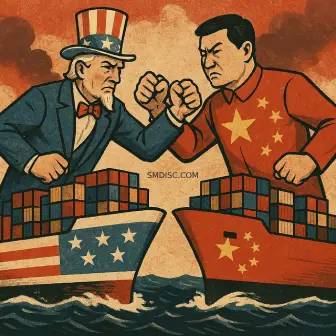The ongoing trade war between the United States and China, marked by a series of escalating tariffs and strategic countermeasures, has significant implications for global trade and economic stability. As of 2025, the situation shows no signs of abating, with both nations deeply entrenched in their positions, making a resolution unlikely in the near term.
Impact on Global Markets

The strategic imposition of tariffs by the US has been carefully targeted, affecting critical sectors such as technology, semiconductors, and essential materials for batteries. This approach aims to leverage American strengths while pinpointing Chinese vulnerabilities, particularly in areas where China controls significant portions of the supply chain.
China's response has been equally strategic, focusing on rare earth minerals and other critical resources, which are pivotal for the US technology sector. This tit-for-tat strategy highlights a deep-seated strategic rivalry that extends beyond mere trade balances, touching on issues of technological supremacy and economic security.
A. Broader Economic Consequences
The trade war's repercussions are global, affecting supply chains, inflating prices, and slowing economic growth. For instance, the IMF has projected a contraction in world trade, which underscores the broader economic ripple effects of this standoff.
B. Strategic Considerations for Other Nations
Countries around the world find themselves in a precarious position, needing to navigate a landscape where two superpowers are at odds. Here are some strategies that could be considered:
- Diversification: Nations should look to diversify their trade partnerships and not overly rely on either the US or China. Engaging more with other regional powers and exploring new trade agreements could mitigate risks associated with the trade war.
- Investment in Innovation: Developing domestic industries and investing in technology and innovation can reduce dependence on contested supply chains. Countries that establish themselves as leaders in emerging technologies may avoid being caught in the crossfire of US-China tensions.
- Balanced Diplomacy: Maintaining a balanced diplomatic stance between the US and China is crucial. Nations should avoid picking sides where possible and instead focus on advocating for stable, rules-based international trade systems.
- Strengthening Regional Alliances: Strengthening regional alliances and participating in multilateral trade agreements can provide collective bargaining power and a buffer against the pressures from US-China tensions.
- Economic Policy Adjustments: Implementing flexible economic policies that can adapt to rapid changes in the trade environment will be crucial. This includes adjusting tariffs and trade barriers in response to shifting global dynamics.
In conclusion, the US-China trade war demands a strategic reevaluation of how nations conduct their trade and diplomatic relations. By diversifying economic partners, investing in domestic capabilities, and maintaining balanced international relations, countries can navigate this challenging environment more effectively. As the global landscape continues to evolve, agility and strategic foresight will be key in mitigating the impacts of this prolonged economic conflict.



